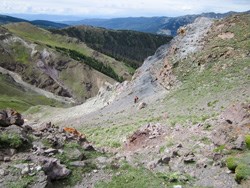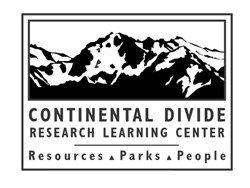
NPS photo / Karina Puikkonen
Rocky Mountain National Park (RMNP) has a rich tradition of collaborating with partners to conduct scientific research in the park. If you are interested in conducting research in RMNP please visit the Integrated Resource Management Applications (IRMA) website and the NPS Research Permit and Reporting System website to understand what prior research has been completed to date. These websites contain Investigators Annual Reports (IAR), publications, reports, and spatial datasets for RMNP that can help researchers determine research needs, prepare their permit applications, and understand reporting requirements. IAR’s are mandatory year-end reports required from all Principal Investigators (PI's) who engage in science and resource management activities in the park.
Park managers utilize the most current science and research to support the adaptive management of RMNP. Research proposals and projects that address management relevant questions will be given the highest priority. To understand what management questions or concerns are the most relevant please visit the RMNP Management Plan Website. This site contains information on the most recent management plans along with the RMNP Foundation Document which outlines the park’s strategy. Researchers are also invited to conduct studies in their areas of expertise in the national parks when the work promises to yield information that is useful to park management. NPS policy discourages studies that are not likely to produce results having some intrinsic value for preserving or managing park resources.
Proposed projects cannot negatively affect park resources or visitors and need to contribute to a deeper understanding of Rocky Mountain National Park (RMNP). Research activities that require a permit include:
Park managers utilize the most current science and research to support the adaptive management of RMNP. Research proposals and projects that address management relevant questions will be given the highest priority. To understand what management questions or concerns are the most relevant please visit the RMNP Management Plan Website. This site contains information on the most recent management plans along with the RMNP Foundation Document which outlines the park’s strategy. Researchers are also invited to conduct studies in their areas of expertise in the national parks when the work promises to yield information that is useful to park management. NPS policy discourages studies that are not likely to produce results having some intrinsic value for preserving or managing park resources.
Proposed projects cannot negatively affect park resources or visitors and need to contribute to a deeper understanding of Rocky Mountain National Park (RMNP). Research activities that require a permit include:
- Fieldwork
- Specimen collection
- Equipment installation
- Resource monitoring
- Resource inventory
- Potential resource / visitor disturbance
Natural, social and cultural research projects also need to inform management decisions. The CDRLC may grant limited funding to studies that address park needs.

NPS photo / Bill Peterson
How to Apply
Applications for a Research and Collection Permit are coordinated through the NPS Research Permit and Reporting System. This is done by creating an investigator’s profile, then “Submit applications for research permits” and following the subsequent instructions.
It is highly recommended to submit a research proposal or study plan in addition to the application. Proposals and study plans can be attached during the on-line application process or can be sent directly to the park Research Coordinator either electronically or via regular mail. The application should clearly identify research questions to be answered, research methods, and locations to be studied in the park. Park personnel cannot approve a permit application without knowing the locations and methods to be used. Please be as detailed as possible.
Researchers are encouraged to submit their application at least 90-days in advance of the time they plan to arrive in the park. Processing and approval of a permit application involves several steps which include: various levels of review and compliance with NEPA, park regulations, designated wilderness management, and cultural resource protection. The park is 95 percent designated wilderness and research activities in these areas have certain requirements. Learn more about conducting research in wilderness.
Additional review may be required depending on the nature of the research. For example, any research project handling mammals will require approval from the Institutional Animal Care and Use Committee (IACUC) before a research permit can be approved. Research done in Research Natural Areas also requires specialized permission. Applicants may be contacted by park staff and requested to provide additional information or clarification about the proposed work. Upon completion of these reviews, applicants will be notified via e-mail or telephone about the status of their permit. Researchers will be mailed a draft permit containing any changes or mitigations required.
Researchers may have mitigations or conditions imposed that are specific to RMNP. These are sometimes necessary due wilderness values, temporary closures of areas, park operation, or other regulations. Once reviewed, researchers will sign the draft and return to the park for final approval by the Park Superintendent. Final permits will then be mailed back to the researcher with a permission letter to conduct the research. This paperwork must be carried each time the researcher is in the park.
Researchers might be asked to submit a formal safety plan to the park’s Research Coordinator and/or to receive a safety briefing before beginning field work. RMNP can be a dangerous place with multiple hazards including: high elevation, rapidly changing weather, and rough terrain. Researchers carrying out their work in front country areas or in plain view of the public may also be asked to display some type of apparel that clearly identifies them as members of a field research team. The park has a limited number of colored vests and car magnets that display appropriate identifying marks available for loan if needed.
Reporting Requirements
Data (and metadata) obtained in a national park under the authority of a Research and Collection Permit must be reported and provided to the park. Guidelines for reporting results in the appropriate formats will be furnished to investigators conducting research. A digital copy of original data files, any derived data products and metadata must be submitted to the park upon completion of the work. Investigators needing assistance or that have questions on reporting their data may contact the park’s Research Coordinator.
Researchers that have obtained a Research and Collection Permit are required to submit an Investigator's Annual Report (IAR) at the end of each year. This can be submitted online at the NPS Research Permit and Reporting System. Completion of an IAR are required each year of the project from initial data collection until a final report is submitted. Failure to submit an IAR may impact the renewal of future permits. IAR's are intended to be brief, stand-alone summaries to communicate the highlights of objectives and research progress and findings to park management, park interpreters, and the public. Upon completion of a project, investigators must submit a copy of the final report or publication and data for the parks library and data management. We encourage investigators to submit a one to two page layman's abstract along with their final report.

CDRLC Research Support Services
The CDRLC provides a variety of services to help researchers including:
- Assist with research compliance processes
- Provide project ideas for management needs
- Make recommendations for field logistics
- Arrange low-cost researcher housing and/or camping for fieldwork
- Organize access to park archives and specimens
Last updated: December 18, 2023
